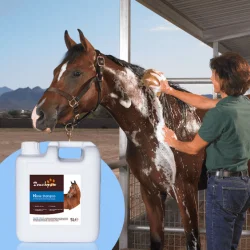Here's an overview of essential horse care practices
2024-01-26
Caring for a horse involves various aspects, from providing proper nutrition and regular veterinary care to maintaining a suitable living environment. Here's an overview of essential horse care practices:
1. Nutrition:
- Forage: Horses require a diet rich in forage, such as hay or pasture. High-quality hay should be fed regularly to meet their fiber needs.
- Grain and Concentrates: Depending on factors like age, weight, and activity level, horses may need additional concentrates, such as grains or specialized feeds. Consult with a veterinarian or equine nutritionist for appropriate recommendations.
2. Clean Water:
- Horses should have access to clean and fresh water at all times. Regularly clean water buckets or troughs to prevent the growth of algae and ensure water quality.
3. Shelter:
- Provide adequate shelter to protect horses from extreme weather conditions, whether it's hot sun, rain, wind, or cold temperatures. This can include barns, run-in sheds, or well-designed shelters in pastures.
4. Regular Exercise:
- Horses need regular exercise to maintain their physical and mental well-being. Turnout in pastures, riding, lunging, or other forms of exercise help keep horses healthy and prevent boredom.
5. Hoof Care:
- Regular hoof care is essential. This includes cleaning hooves, trimming them every 6-8 weeks, and addressing any signs of hoof-related issues. Farrier visits are crucial for proper hoof maintenance.
6. Dental Care:
- Horses need regular dental check-ups and floating (filing down sharp points on teeth) to ensure proper chewing and prevent dental issues. Dental care should be performed by a qualified equine dentist or veterinarian.
7. Vaccinations and Parasite Control:
- Follow a vaccination schedule recommended by a veterinarian to protect horses from common diseases. Implement a regular deworming program to control internal parasites.
8. Grooming:
- Regular grooming is not only essential for maintaining a horse's coat and skin health but also provides an opportunity to check for any abnormalities, injuries, or signs of illness.
9. Monitoring Health:
- Regularly monitor your horse's health, behavior, and overall condition. Promptly address any signs of illness, injury, or behavioral changes by consulting with a veterinarian.
10. Proper Tack and Equipment:
- Ensure that tack (saddles, bridles, etc.) fits well and is in good condition. Regularly check and replace any worn or damaged equipment to prevent discomfort or injury.
11. Social Interaction:
- Horses are social animals and thrive on interaction with other horses. Whenever possible, provide opportunities for socialization in a herd environment.
12. Emergency Preparedness:
- Have a plan in place for emergencies, including access to veterinary care, first aid supplies, and evacuation plans if necessary.
13. Regular Veterinary Check-ups:
- Schedule routine veterinary check-ups to assess the overall health of your horse. This includes dental exams, vaccinations, and any necessary health assessments.
14. Proper Waste Management:
- Dispose of manure and waste properly to maintain a clean and healthy environment for the horse and reduce the risk of parasites and flies.
Remember that individual horses may have specific needs, and it's important to tailor care practices accordingly. Regular and attentive care is crucial to ensuring the well-being and longevity of your horse. If you have specific concerns or questions, consult with a veterinarian or equine care professional for personalized advice.



